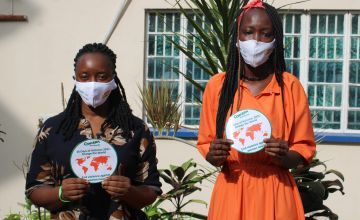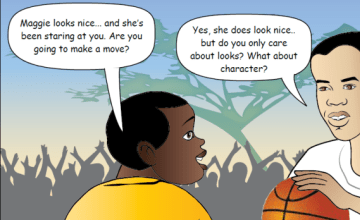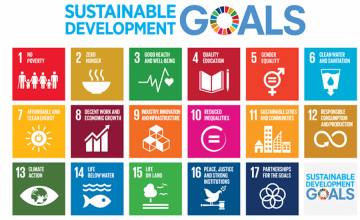
Read our 2023 annual report

Knowledge Hub
40 years on, women and girls are most impacted - the face of HIV in 2021 is an adolescent girl.
In 2020, there were 37.7 million people living with HIV globally, and 53% were women and girls, according to the United Nations.
In fact, women and girls accounted for 50% of all new infections in 2020 and every week, around 5,000 young women aged between 15 and 24-years-old became infected with HIV.
The staggering truth of it is that young women in Sub-Saharan Africa are twice as likely as men to be living with HIV, while six in seven new HIV infections among adolescents aged from 15 to 19 affect girls.
Gender inequality and gender-based violence leave women and girls more vulnerable to HIV, restricting the rights of women and adolescent girls, including their ability to refuse unwanted sex or negotiate safer sex, and to access HIV and sexual and reproductive health services.
Concern responses in 2020
Working in partnership with Sonke Gender Justice, a South African NGO specialising in gender equality, prevention of gender-based violence and HIV, Concern Worldwide aims to standardise our gender transformational approach and build internal capacity to improve our integrated HIV response programming.

The aim of Concern’s HIV and AIDS work ongoing is to help reduce new HIV infection and to minimise the impact of HIV and AIDS among people living in extreme poverty, through mainstreaming and integrated responses in all sector programmes, and in support of national government efforts within host countries.
In Chad, the focus is on sensitization and education on HIV.
During mobile clinics, free and voluntary testing for HIV is offered, especially to pregnant women who come for antenatal consultations. Main topics discussed with target communities were on hygiene awareness, exclusive breastfeeding, food diversity, sexually transmitted infection (STI) and HIV prevention and on gender-based violence topics.
In Democratic Republic of Congo, Ebola outbreaks lead to increased morbidity and mortality in vulnerable populations including children, women, people living with HIV and AIDS and other chronic conditions, populations living in rural areas and isolated areas with poor access to health care, and those living in areas affected by population movement. Concern continues to support Ebola and HIV outbreak responses in DRC.
The Ethiopia emergency nutrition response for displaced people includes all vulnerable refugees with special nutritional needs such as those living with HIV and/or TB. Women living with HIV and AIDS and other disabilities are prioritised during targeting and beneficiaries selection in all of the emergency response programmes.
In the Malawi graduation programme, the findings from the annual outcome survey positively showed that women consultation in key areas of household decision-making has improved by 11% from baseline to 48% (Year 4) for graduation households. Messaging on HIV and AIDS are disseminated to target household and communities during activities including trainings and at coordination meetings.
Concern Pakistan with partner organisations in 2020 marked all international days of equality (e.g. International Women’s Day, 16 Days of Activism, International Boys and Men’s Day, International Day of People With Disabilities, HIV and AIDS etc.). As part of the 16 days of activism, a webinar session was conducted with Concern and partner staff on “Preventing Gender Based Violence.”
In Bangladesh, dissemination of awareness raising and education messages on HIV and AIDS by a trained group of volunteers and Change Makers targeting women especially was conducted.
In Cibitoke and Kirundo provinces in Burundi, trained Care Group Volunteers raised awareness in the community on prevention measures against HIV and AIDS, and the project encouraged pregnant women to take early antenatal care consultations to be tested for HIV, so as to intervene with prevention of mother-to-child transmission as necessary.
In Haiti, the need to emphasize on sexual education was identified during the first year of the ‘Strong children today are a strong society tomorrow’ project and more focus on sexual education, including on STIs, HIV was included in the training package for adolescents, targeting adolescent girls and boys.
Prevention of HIV and AIDS among adolescents is a core topic in life skills and mentorship approaches being rolled by the Concern Kenya education programme, targeting especially adolescent girls, those in and out-of-school in urban informal settlements of Nairobi. A Comic Book was developed by the project, with the adolescents, entitled - Better Lives: Life skills in maturation, drug abuse and HIV.

Ending discrimination against those living with HIV and AIDS
Outcome 3 of the Irish Aid funded ANSARM (Accelerating Nutrition and Sustainable Agriculture and Resource Management) programme in Liberia is Increased gender equitable behaviours in target communities and households within target communities and increased knowledge regarding HIV and AIDS and Ebola Virus Disease (EVD).
In 2020, Concern designed and distributed information, education and communication (IEC) materials to community role models with messages promoting knowledge on prevention of HIV and AIDS and EVD.
Concern also joined the campaign to commemorate World AIDS day in Grand Bassa. During the campaign 115 people living with HIV (PLHIV) were reached with hygiene kits and COVID-19 protective kits. Messages on stigma and testing were also shared on radio and during the outreach community sensitisation campaigns.
The WASH (water, sanitation and hygiene) programme in Sierra Leone explained to programme participants that no one will be discriminated against due to their HIV and AIDS status, promoting equality of all.
During Self Help Groups' trainings in Somalia, the programme delivered sessions on HIV AIDS, including on transmission, prevention, myths and misconceptions about HIV and AIDS, and on the importance of protecting women and girls.
Integrated Health and Nutrition, WASH and Food Security Programme in Aweil West and Aweil North in South Sudan increased awareness and knowledge during World AIDS Day 2020 sessions. Relevant staff were informed on referral pathway for HIV and AIDS cases diagnosed in a health facility, so that timely treatment could be initiated.
In Sudan’s country programme, HIV prevention education has been integrated during community engagement (meetings, trainings and awareness raising sessions), and young women and men are targeted. In the ECHO funded programme, HIV and AIDS education is imbedded in the community engagement activities. Mapping of referral services is included in the capacity building trainings of health facility staff.
To strengthen Concern’s gender transformative work, we expanded our relationship with Sonke Gender Justice to cover all countries over the period 2020-22.
Global inequalities affect us all
Forty years since the first AIDS cases were reported in 1981, HIV still threatens the world.
The world is off track from delivering on commitments to end AIDS by 2030. It is even risking a resurgence, not because of a lack of knowledge or tools, but because of structural inequalities that obstruct proven solutions to HIV prevention and treatment in some countries. The rights of key populations are not always protected.
Economic, social, cultural and legal inequalities must be ended as a matter of urgency if we are to end AIDS by 2030.
This World AIDS Day let’s remind all governments that global inequalities affect us all, no matter who we are or where we live. This World AIDS Day let’s demand action to end inequalities and end AIDS and all other pandemics that thrive on inequalities.
Delivering on the Sustainable Development Goals

Gender equality is one of the most important steps to ending extreme poverty. The most vulnerable women and girls where Concern is working deserve to be heard and seen. It is critical to deliver on Sustainable Development Goals (SDGs) 3 and 5 by 2030.
SDG 3, Target 3.3: By 2030, end the epidemics of AIDS, tuberculosis, malaria and neglected tropical diseases and combat hepatitis, water-borne diseases and other communicable diseases
SDG 5, Target 5.1: End all forms of discrimination against all women and girls everywhere
SDG 5, Target 5.2: Eliminate all forms of violence against all women and girls in the public and private spheres, including trafficking and sexual and other types of exploitation
World AIDS Day falls within the 16 Days of Activism Against Gender Violence.
Click the button below to hear Breda Gahan's interview with Darren J. Prior on Near FM to mark World AIDS Day 2021.
How you can help
Buy a gift
With an extensive range of alternative gifts, we have something to suit everybody.
Leave a gift in your will
Leave the world a better place with a life-changing legacy.
Become a corporate supporter
We partner with a range of organisations that share our passion and the results have been fantastic.
Volunteer with Concern
There are lots of opportunities for you to get involved with Concern as a volunteer.
Fundraise for Concern
From mountain trekking to marathon running, cake sales to table quizzes, there are lots of ways you can support our work.
Donate now
Give a once-off, or a monthly, donation today.




